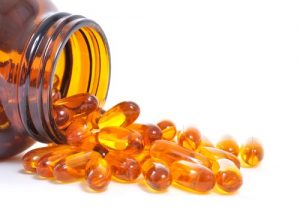Can Natural Approaches Cure ADHD?
Author: Dr. Stephen Chaney
 You keep seeing headlines saying that omega-3 fatty acids can help children with ADHD. But your pediatrician doesn’t recommend them. Why not? Is the story about omega-3s helping with ADHD symptoms just another myth created by supplement companies wanting to lighten your wallet? Or, is your doctor not keeping up with the latest scientific advances? As usual, the truth lies somewhere in between.
You keep seeing headlines saying that omega-3 fatty acids can help children with ADHD. But your pediatrician doesn’t recommend them. Why not? Is the story about omega-3s helping with ADHD symptoms just another myth created by supplement companies wanting to lighten your wallet? Or, is your doctor not keeping up with the latest scientific advances? As usual, the truth lies somewhere in between.
This week I will discuss the latest study (J.P-C. Chang et al, Neuropyschopharmacology, 43: 534-545, 2018) on omega-3s and ADHD symptoms. It provides an excellent update on the role of omega-3s in reducing ADHD symptoms.
How Was The Study Done?
 The study was a meta-analysis. Meta-analyses combine the data from multiple studies. Their strength comes from the fact that they include data from subjects of different backgrounds and ethnicity. However, a meta-analysis can never be stronger than the studies it includes in its analysis. Simply put, if it combines data from poorly designed studies, it is no better than the weakest study.
The study was a meta-analysis. Meta-analyses combine the data from multiple studies. Their strength comes from the fact that they include data from subjects of different backgrounds and ethnicity. However, a meta-analysis can never be stronger than the studies it includes in its analysis. Simply put, if it combines data from poorly designed studies, it is no better than the weakest study.
The problem is that there have been a lot of poorly designed studies in this area of research. Some studies have included both children and adults. Others included subjects with psychiatric diagnoses other than ADHD. Still others combined omega-3 supplementation with other vitamins and nutrients. Finally, some used inadequate measures of ADHD symptoms and cognitive function. Because the design of previous studies has been so varied, the results have been conflicting. Some studies have found that omega-3 supplementation reduced ADHD symptoms. Others found no benefit.
Because of the confusion arising from poorly designed studies, the authors of this study applied very rigorous criteria in selecting the studies to be included in their meta-analysis. Their criteria were:
- The studies were randomized, double-blind, placebo-controlled trials of mega-3 supplementation with DHA or EPA alone or in combination.
- Participants were school-aged children (4-12 years) and adolescents (13-17 years) who had a diagnosis of ADHD.
- The study measured clinical symptoms of ADHD as reported by parents. Some also included reports by teachers. When cognitive data were included, the studies relied on well-established cognitive tests.
- The data allowed a calculation of effect size (this is a statistical requirement that simply says the quality of the data were good enough to reliably calculate the difference between the supplemented and control groups).
- The publications were in peer reviewed journals.
They ended up with seven studies with a total of 534 subjects (318 received omega-3s and 216 received a placebo).
They also performed a separate metanalysis of studies that have measured omega-3 levels in school-aged children and adolescents who had been diagnosed with ADHD. The criteria for inclusion in this metanalysis were similarly rigorous. They ended up including nine studies totaling 558 subjects, 297 with ADHD and 261 controls in this meta-analysis.
Do Omega-3s Reduce ADHD Symptoms?
 The results from the first meta-analysis were:
The results from the first meta-analysis were:
- Omega-3 supplementation significantly improved parental reports of total ADHD symptoms scores as well as scores of inattention and hyperactivity.
- When the children were given cognitive performance tests, the omega-3 supplemented group performed better than the placebo group when tested for omission errors (for example, a number or word left out in a memory test) and commission errors (an incorrect number or word in a memory test).
- A dose of EPA + DHA of 500 mg/day or greater appeared to be optimal.
The results from the second meta-analysis were:
- Children and adolescents with ADHD had significantly lower levels of DHA, EPA, and total omega-3s in their red blood cells (a good measure of omega-3 status) than controls.
The authors concluded: “In summary, there is evidence that omega-3 supplementation improves clinical symptoms and cognitive performances in children and adolescents with ADHD, and that these youth have a deficiency of omega-3 levels. Our findings provide further support to the rationale for using omega-3s as a treatment option for ADHD.”
The authors went on to say: “In the context of ‘personalized medicine,’ it is tempting to speculate that a subpopulation of youth with ADHD and low levels of omega-3s may respond better to omega-3 supplementation, but there are no studies to date attempting this stratification approach [looking at the effect of omega-3 supplementation in the subpopulation with both ADHD and omega-3 deficiency]…Therefore, stratification of ADHD children by omega-3 levels…could be one approach to optimize the therapeutic effects of omega-3 supplementation.”
Basically, they are suggesting that the benefits of omega-3 supplementation are likely to be greatest for those children with ADHD who are also omega-3 deficient. They are also saying that future studies should measure omega-3 status before and after supplementation so that the true benefit of omega-3 supplementation can be determined. I agree
What Does This Mean For You?
 This study was very well done. By including only the best designed studies in their meta-analysis, the authors have provided good evidence that omega-3s can be of benefit in reducing ADHD symptoms. The authors also pointed out that low-dose omega-3 supplementation is virtually free of side effects. Thus, this is an option that should be tried first, before considering medications to control ADHD symptoms.
This study was very well done. By including only the best designed studies in their meta-analysis, the authors have provided good evidence that omega-3s can be of benefit in reducing ADHD symptoms. The authors also pointed out that low-dose omega-3 supplementation is virtually free of side effects. Thus, this is an option that should be tried first, before considering medications to control ADHD symptoms.
On the other hand, I wouldn’t expect miracles. This was not a huge effect. Not all the ADHD symptoms improved with omega-3 supplementation. Teacher’s reports did not show the same benefits as parent’s reports.
There are two ways to interpret the limitations of omega-3 benefits seen in this meta-analysis.
- Clinical studies report the average results for all the children in the study. Your child may not be average. If your child doesn’t like fish, especially the oil, cold-water fish that are rich in omega-3s, they may experience a greater benefit from omega-3 supplementation.
- The benefit of omega-3s seen in this meta-analysis is just one facet of a holistic, natural approach for controlling ADHD without drugs. One of the best reviews on natural approaches for controlling ADHD was written by two pediatricians with years of experience dealing with ADHD. I wrote about their review in a previous issue, adhd diet vs medication, of “Health Tips From the Professor”. You should check it out. There was a lot of wisdom in their advice.
The Bottom Line
- A recent meta-analysis has reported that omega-3 supplementation improves clinical symptoms and cognitive performances in children and adolescents with ADHD.
- The optimal dose appeared to be 500 mg/day or above.
- The authors also reported that children with ADHD were more likely to be omega-3 deficient than children without ADHD and suggested that omega-3 supplementation is most likely to be effective for those children who are omega-3 deficient.
- The authors also pointed out that low-dose omega-3 supplementation had negligible side-effects, so it should be tried before the child is put on medication.
- Omega-3s are just one facet of a holistic, natural approach for reducing ADHD symptoms.
For more details, read the article above.
These statements have not been evaluated by the Food and Drug Administration. This information is not intended to diagnose, treat, cure or prevent any disease.
